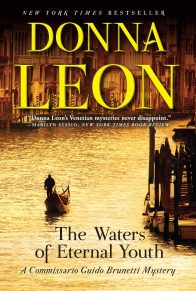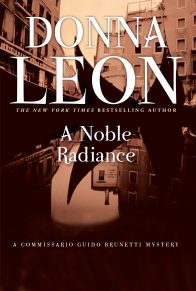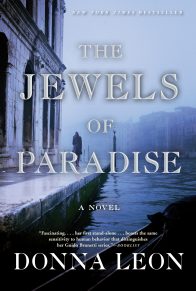When the doorbell rang, Brunetti lay supine on the sofa in his living room, a book propped open on his stomach. Because he was alone in the apartment, he knew he had to get up and answer it, but before he did, he wanted to finish the last paragraph of the eighth chapter of the Anabasis, curious to know what new disasters awaited the retreating Greeks. The bell rang a second time, two insistent, quick buzzes, and he put the book face down, took off his glasses and placed them on the arm of the sofa, and got to his feet. His steps were slow, regardless of the insistence with which the bell had sounded. Saturday morning, off duty, the house to himself, Paola gone to Rialto in search of soft-shelled crabs, and the doorbell had to ring.
He assumed it was one of the children’s friends, come in search of either Chiara or Raffi or, worse, one of the bringers of religious truth who delighted in interrupting the rest of the hard-working.
He asked of life nothing more than to lie on his back reading Xenophon while he waited for his wife to come home with soft-shelled crabs.
“Yes?” he said into the answerphone, making his voice sound so unwelcoming as to discourage aimless youth and frighten off zeal of any age.
“Guido Brunetti?” a man’s voice asked.
“Yes. What is it?”
“I’m from the Ufficio Catasto. About your apartment.” When Brunetti said nothing, the man asked, “Did you get our letter?”
At the question, Brunetti recalled having received some sort of official document a month or so ago, a paper filled with the catch phrases of bureaucracy, something about the deeds to the apartment or the building permits that were attached to the deeds: he couldn’t remember. He had done no more than glance at it and blanch at the formulaic language, before slipping it back into its envelope and dropping it into the large majolica platter that stood on the table to the right of the door.
“Did you get our letter?” the man repeated.
“Ah, yes,” Brunetti answered.
“I’ve come to talk about it.”
“About what?” Brunetti asked, propping the phone under his left ear and bending to reach toward the pile of papers and envelopes that lay on the platter.
“Your apartment,” the man answered. “About what we wrote in the letter.”
“Of course, of course,” Brunetti said, leafing through papers and envelopes.
“I’d like to talk to you about it if I might.”
Caught off guard by the request, Brunetti conceded. “All right,” he said, pushing the buzzer that would open the portone four floors below. “Top floor.”
“I know,” the man answered.
Brunetti replaced the speaker and pulled a few envelopes from the bottom of the pile. There was a bill from ENEL, a postcard from the Maldives he hadn’t seen before and which he paused to read. And there was the envelope, the name of the issuing office in blue letters at the top left corner. He removed the paper, unfolded it and held it at arm’s length to bring the letters into focus, and read through it quickly.
The same impenetrable phrases caught his eye: “Pursuant to Statute Number 1684–B of the Commission of Fine Arts’; “With reference to Section 2784 of Article 127 of the Civil Code of 24 June 1948, subsection 3, paragraph 5”; “Failure to provide this issuing office with adequate documentation”; “Value calculated according to sub-paragraph 34–V–28 of the Decree of 21 March 1947.” He ran his eye quickly down the first page and then turned to the second, but still he found only officialese and numbers. Schooled by long experience working in the Venetian bureaucracy, he knew something might be hidden in the last paragraph, and so he turned to that, which did indeed inform him that he could expect further communication from the Ufficio Catasto. He turned back to the first page but whatever meaning might lurk behind the words continued to elude him.
Close as he was to the front door, he could hear the footsteps on the last flight of steps and so opened the door even before the doorbell rang. The man in front of him was still moving up the steps and had already raised a hand to knock, and so the first thing Brunetti saw was the sharp contrast between the raised fist and the perfectly unassuming man who stood behind it. The young man, startled by the sudden opening of the door, had surprise splashed across his face. The face was long, his nose the thin beak so common to Venetians. He had dark brown eyes and brown hair that looked as if it had recently been cut. He wore a suit which might have been blue but might just as easily have been grey. His tie was dark and had a small, indistinguishable pattern. In his right hand he carried a worn brown leather briefcase; it completed the picture of every colorless bureaucrat Brunetti had ever had to deal with, as though part of their job training was the mastery of the art of rendering themselves invisible.
“Franco Rossi,” he said, shifting his briefcase to his other hand and extending the right.
Brunetti took it, shook hands briefly, and stepped back to allow him to enter.
Politely, Rossi asked permission and then stepped into the apartment. Inside, he stopped and waited for Brunetti to tell him where to go.
“In here, please,” Brunetti said, leading him back toward the room where he had been reading. Brunetti went over to the sofa, slipped the old vaporetto ticket he used as a marker inside his book, and placed it on the table. He gestured to Rossi to take a seat opposite him and himself sat on the sofa.
Rossi sat on the edge of the chair and pulled the briefcase up on to his knees. “I realize it’s Saturday, Signor Brunetti, so I’ll try not to take too much of your time.” He looked across at Brunetti and smiled. “You received our letter, didn’t you? I hope you’ve had time to consider it, Signore,” he said with another small smile, then lowered his head and opened his briefcase. He pulled a thick blue folder from it. He centred it carefully on top of the briefcase and tapped at an errant paper that tried to slip from the bottom until it was safely back inside.
“As a matter of fact,” Brunetti said, taking the letter from his pocket, where he’d stuffed it when he answered the door, “I was just rereading it, and I must say I find the language a bit impenetrable.”
Rossi looked up, and Brunetti saw a flash of genuine surprise pass across his face. “Really? I thought it was very clear.”
With an easy smile, Brunetti said, “I’m sure it is to those of you who deal with these matters every day. But to those of us who aren’t familiar with your office’s particular language or terminology, well, it’s a bit difficult to understand.” When Rossi said nothing, Brunetti added, “I’m sure all of us know the language of our own bureaucracy; perhaps it’s only when we pass into that of another that we find it difficult.” He smiled again.
“What bureaucracy are you familiar with, Signor Brunetti?” Rossi asked.
Because he was not in the habit of broadcasting the fact that he was a policeman, Brunetti answered only, “I studied law.”
“I see,” replied Rossi. “I shouldn’t think our terminology would be very different from yours.”
“Perhaps it’s no more than my unfamiliarity with the civil codes referred to in your letter,” Brunetti said smoothly.
Rossi considered this for a moment and then answered, “Yes, that’s entirely possible. What is it, though, that you don’t understand?”
“What it means,” Brunetti answered directly, no longer willing to pretend that he understood.
Again that puzzled look, so frank that it made Rossi look almost boyish. “I beg your pardon?”
“What it means. I read it, but because I have no idea, as I told you, of the nature of the regulations to which it refers, I don’t know what it means, what it all applies to.”
“Your apartment, of course,” Rossi answered quickly.
“Yes, I understood that much,” Brunetti said in a voice he had to force to sound patient. ‘since it came from your office, I gathered at least that. What I don’t understand is what interest your office could take in my apartment.” Nor, for that fact, did he understand why an employee of that office should choose to visit him on a Saturday.
Rossi looked down at the folder on his lap and then up at Brunetti, who was surprised suddenly to notice how long and dark his lashes were, much like a woman’s. “I see, I see,” Rossi said, nodded, and looked back down at the folder. He opened it and pulled out a smaller one, studied the label on its cover for an instant, and handed it across to Brunetti, saying, “Perhaps this will help to make it clear.” Before he closed the folder that was still on his lap, he carefully aligned the papers that lay inside.
Brunetti opened the folder and removed the papers from it. Seeing how close-set the type was, he leaned to the left and picked up his glasses. At the top of the first page was the address of the building; below it appeared plans of the apartments beneath his own. On the next page was a list of past owners of each of those spaces, beginning with the storerooms on the ground floor. The next two pages contained what appeared to be capsule histories of the restorations done to all of the apartments in the building since 1947, listing the dates when certain permissions were requested and given, the date work actually began, and the date when final approval was given of the completed work. No mention was made of his own apartment, which suggested to Brunetti that this information must be contained in the papers Rossi still held.
From what he could make out, Brunetti realized that the apartment directly below them had last been restored in 1977, when the current owners moved in. Last restored officially, that is. They’d had dinner with the Calistas more than a few times and had been pleased with the almost unimpeded view that spread out from the windows of their living room, yet the windows indicated on the plans looked quite small, and there seemed to be only four, not six. He saw that the small guest bathroom to the left of the Calistas’ entrance hall was nowhere indicated. He wondered how that could be, but Rossi was certainly not the man to ask. The less the Ufficio Catasto knew about what got added to or shifted around inside the building, the better it would be for everyone living there.
Glancing across at Rossi, he asked, “These records go back a long time. Have you any idea how old the building is?”
Rossi shook his head. “Not precisely. But from the location and the windows on the ground floor, I’d say the original structure dates from the late fifteenth century, not earlier.” He paused and considered this for a moment, then added, “And I’d say the top floor was added in the early nineteenth century.”
Brunetti looked up from the plans, surprised. “No, it’s much later than that. From after the war.” When Rossi didn’t respond, he added, “The Second World War.”
When Rossi still didn’t comment, Brunetti asked, “Wouldn’t you say that’s true?”
After a moment’s hesitation, Rossi said, “I was talking about the top floor.”
“So am I,” Brunetti said sharply, annoyed that this functionary of an office that dealt with building permits didn’t understand something as simple as that. He softened his voice and continued, “When I bought it, it was my understanding that it was added after the last war, not in the nineteenth century.”
Instead of answering him, Rossi nodded toward the papers that were still in Brunetti’s hand. “Perhaps you could take a closer look at the last page, Signor Brunetti.”
Puzzled, Brunetti read again through the last paragraphs, but as far as he could make out, they still concerned only the two apartments below him. “I’m not sure what you want me to see, Signor Rossi,” he said, looking up and removing his glasses. “This concerns the apartments below us, not this apartment. No mention is made of this floor.” He turned the paper over to see if something was written on the other side, but it was blank.
“That’s why I’ve come,” Rossi said, sitting up straighter in his chair as he spoke. He bent down and set his briefcase on the floor to the left of his feet, keeping the folder on his lap.
“Yes?” Brunetti said, leaning forward to hand the other one back to him.
Rossi took it from him and opened the larger folder. He carefully slipped the smaller one back in place and closed the file. “I’m afraid there is some doubt as to the official status of your apartment.”
“Official status’?” Brunetti repeated, looking off to the left of Rossi, to the solid wall and then up to the equally solid ceiling. “I’m not sure I understand what you mean.”
“There’s some doubt about the apartment,” Rossi said with a smile that Brunetti thought looked a bit nervous. Before Brunetti could again ask for clarification, Rossi went on, “That is, there are no papers in the Ufficio Catasto to show that building permits were ever granted for this entire floor, or that they were approved when it was built or,” and here he smiled again, “that, in fact, it was ever built.” He cleared his throat and added, “Our records show the floor below this one as the top floor.”
At first Brunetti thought he was joking, but then he saw the smile disappear and realized that Rossi was serious. “But all of the plans are in the papers we got when we bought it,” Brunetti said.
“Could you show them to me?”
“Of course,” Brunetti answered and got to his feet. Without excusing himself, he went down to Paola’s office and stood for a moment, studying the spines of the books that lined three walls of the room. Finally he reached to the top shelf and pulled down a large manila envelope filled with papers and took it back to the other room. Pausing inside the door to open the envelope, he pulled out the grey folder they’d received, almost twenty years ago, from the notary who had handled the purchase of the apartment for them. He came back to Rossi and handed this folder to him.
Rossi opened it and began to read, his finger tracing slowly down each line. He turned the page, read the next and thus until the end. A muffled “Hmm” escaped his lips, but he said nothing. He finished the file, closed it, and left it lying on his knees.
“Are these the only papers?” Rossi asked.
“Yes, only what’s in there.”
“No plans? No building permissions?”
Brunetti shook his head. “No, I don’t remember anything like that. Those are the only papers we were given at the time of the purchase. I don’t think I’ve looked at them since then.”
“You said you studied law, Signor Brunetti?” Rossi finally asked.
“Yes, I did.”
“Are you practicing as a lawyer?”
“No, I’m not,” Brunetti answered and left it at that.
“If you were or if you had been at the time you signed these papers, I’d be surprised you didn’t notice, on page three of the deed, the paragraph which states that you are buying the apartment in the state, both legal and physical, in which you found it on the day on which ownership passed to you.”
“I believe that’s pretty standard language in any deed of transfer,” Brunetti said, summoning up a vague memory from one of his classes in civil law and hoping it was.
“The part about physical state is, certainly, though that about legal is not. Nor is this following sentence,” Rossi said, opening the folder again and searching until he found the passage. “”In the absence of the condono edilizio, the buyer accepts full responsibility to obtain the same in a timely manner and hereby absolves the sellers of any responsibilities or consequences which might occur in regard to the legal state of the apartment and/or from the failure to obtain this condono.” Rossi looked up, and Brunetti thought he saw a deep sadness in his eyes at the thought that someone might have signed such a thing.
Brunetti had no memory of that particular sentence. Indeed, at the time, they had both been so intent on buying the apartment that he had done what the notary told him to do, signed what he told him to sign.
Rossi turned back to the cover, where the name of the notary was listed. “Did you select this notary?” he asked.
Brunetti didn’t even remember the name and had to look at the cover. “No, the seller suggested we use him, and so we did. Why?”
“No reason,” Rossi said, too quickly.
“Why? Do you know something about him?”
“I believe he’s no longer practicing as a notary,” Rossi said in a soft voice.
Finally out of patience at Rossi’s questions, Brunetti demanded, “I’d like to know what all this means, Signor Rossi. Is there some dispute about our ownership of this apartment?”
Rossi gave his nervous smile again. “I’m afraid it’s a bit more complicated than that, Signor Brunetti.”
Brunetti had no idea what could be more serious than that. “What is it, then?”
“I’m afraid this apartment doesn’t exist.”













